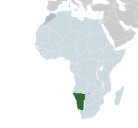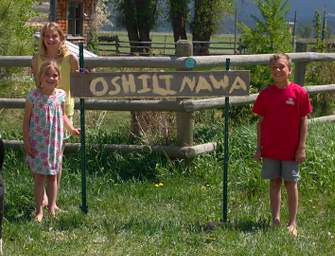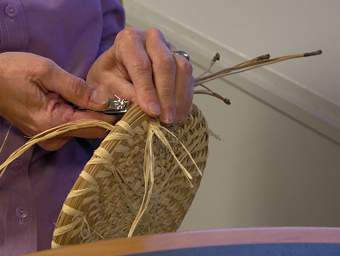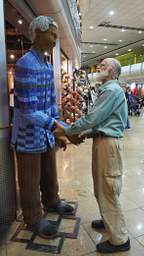
As Dona and I have traveled around, we keep saying we would like to do more than just visit another place. I don't particularly like being a tourist; I'd rather melt into the local community and view the world from that perspective. Many of the places we have gone are in under-developed countries, and we always feel like we ought to be able to contribute more than a few tourist dollars to help out. After all, we are relatively well educated and each have our own talents. I thoroughly enjoyed helping my friend Al von Bachmayr with some straw bale and pallet construction in Anapra, Mexico; and I've always wanted to do more of that sort of thing. Or some sort of thing.
When Dona and I went to Tanzania last February we talked about spending a year and teaching. Dona had found a program that seemed like a good match for us, World Teach. It is a secular organization which works directly with the Ministry of Education in the countries in which it works, so the work you do contributes directly to the official curriculum. Many overseas educational assistance programs are run by religious organizations. While some of them do a pretty good job, all of them attempt to inject their religious beliefs into the education process. If there's one thing the world doesn't need more of, it's religion -- of any kind. We had hoped to visit some World Teach volunteers and places they work while in Tanzania, but time did not allow that. We weren't sure how well we would deal with a year or six months teaching in a place like Tanzania, and one of the things we liked about World Teach was they have a shorter summer program. World Teach doesn't currently have a summer program in Tanzania, but they do have one in Namibia. We were also considering the one for Ecuador. When we looked at the fine print, the cut-off age was 72 for most places; but it was 65 for Namibia. Yikes! This was my last year. If we wanted to go, this had to be it. So we bribed some friends to write us recommendations and sent in our applications. They must have been hard up, as we were accepted. Whoppie!
For the record, we were very pleased with World Teach as an organization. We thought they did an excellent job of placing volunteers, an excellent job coordinating with the host country, and an excellent job of cultural awareness and crash-course teacher-training. To a large extent, this was due to the hard work of the in-country director, Bret McSpadden.
For those of you who are geographically challenged, Namibia is a country. In Africa. It's down south, on the west coast. It's the newest country in Africa, having gained independence in 1990. It's one of the driest countries on earth, and in places, one of the flattest.
 |
| Map from Wikipedia |
Bret McSpadden, the World Teach director in Namibia, was our mentor. He sent us information to give us a leg up on our responsibilities, but knowing exactly where in Namibia we would be teaching was a bit more difficult. He was still waiting to hear back from the Ministry of Education about our placements.
Namibia is a country of contrasts, with a mixture of diverse native ethnic groups and colonial descendants. At the time of independence, they needed to establish a national language. Afrikaans, the language of the colonialists, was inappropriate; and there was a desire not to show preference to any particular ethnic group. Doing so would put them at a distinct advantage in any governmental affairs, and indirectly in affairs of the country as a whole. At the end of the 20th century it was clear that Namibia would be living in a global economy, and so English was chosen as the official language.
A subtle side-effect of having English as the national language is that it puts Namibia, the country, first. When speaking in English, one subconsciously begins to identify first as a Namibian, and second as a member of a particular tribe or group. In a country torn by tribal and colonial wars and injustices, that's a good thing.
The upside of having English as the national language is that we wouldn't have to learn a foreign language. The downside of having English as the national language is that we wouldn't be pushed to learn a foreign language. In Namibia, kids are taught in their native language through grade 4, and from then on all school is in English. It's convenient for us, but a real challenge, because Namibia has no native English speakers. World Teach volunteers generally help with English as a second language in many of the countries in which they work. But our focus in Namibia was to be Information Technology, as the Ministry of Education was keen on students knowing how to deal with the modern computerized world. In spite of that, we felt we would get more out of our time in Namibia if we could speak a little of the local language. But we couldn't get started on that, because we didn't know in which part of the country we would be teaching. The most populus part of the country is the north, up by the Angola border. In that region, Oshikwanyama is the native language. We decided that was our most likely destination, since it is the most densly populated region and a region where World Teach has historically worked. We couldn't find much on the net or in books in terms of Oshikwanyama language courses, but Dona did find a beginner's guide, Hai ti! which we downloaded. We made a bunch of flash cards and went over them at the dinner table. Dona is far better at remembering words than I am, and Oshikwanyama has no resemblance to anything I was familiar with. It wasn't even vaguely similar to Swahili, which we'd studied a little before going to Tanzania. Dang...
The week before we left we learned we would be somewhere in the north; three days before we left we finally learned which town and school. And we didn't have our visas.
When in the Caribbean, everything runs on "Island Time." In Africa, things run on "African Time." Bret assured us that things would be fine, and that even if we didn't have our visas he would meet us at the airport and somehow reach across the barrier and hand them to us. That's my kind of country. The night before we left, we got an email with a not very official looking image of a piece of paper with eight names on it, ours among them. Bret sent us a note saying one of the volunteers was on our flight from New York and didn't have access to a printer, so would we please print another copy...
We had arranged for a friend to house sit for us. He would be taking care of P.C., the cat; and Max, our faithful Australian Shepard. We put the horses out to summer pasture; they would think they had died and gone to heaven, and I hoped not get too fat. At least the pasture wasn't too lush. The big day arrived, and we headed out the driveway.
Wow! Time sure flies and the miles just whiz by when you're having fun. In no time we were greeted by a sign indicating we had arrived somewhere in the north of Namibia. We weren't sure exactly where we were, but it had to be close. Everything in Oshikwanyama starts with 'O', including our region (Ohangwena) and town (also Ohangwena). It looked like our neighbor kids knew as much about Namibia as we did.
 |
| Ella, Hattie, and Will sending us off |
We borded our first plane in Missoula, headed for New York via Salt Lake and unbeknownst to us, Minneapolis. To help the time pass we played Bananagrams and Dona worked on a pine-needle basket. Because of the stupid airline restrictions on "dangerous weapons," Dona couldn't carry pliers onto the plane, but we got around that with a pair of nail clippers. The kind without a dangerous fingernail file.
 |
| Dona Nail Clippers |
Finally, two days later, we touched down in Windhoek, Namibia. We had one week of training before heading off to our school.
We didn't travel a lot while teaching, but did travel after we were done. The map below shows roughly where we went.
 |
| Our Travels through Namibia |
When we were done traveling, we dropped off the camping gear we had borrowed from Bret, turned in the rental car, and took a long plane ride home. We had a 12 hour layover in Johannesburg which would have been a total waste except I got to meet Nelson Mandela! Then another 9 hour layover in JFK. Phew! We were sad to leave, but glad to be home. Max was glad to have us home too!
 |
| Gary meets Nelson Mandela |